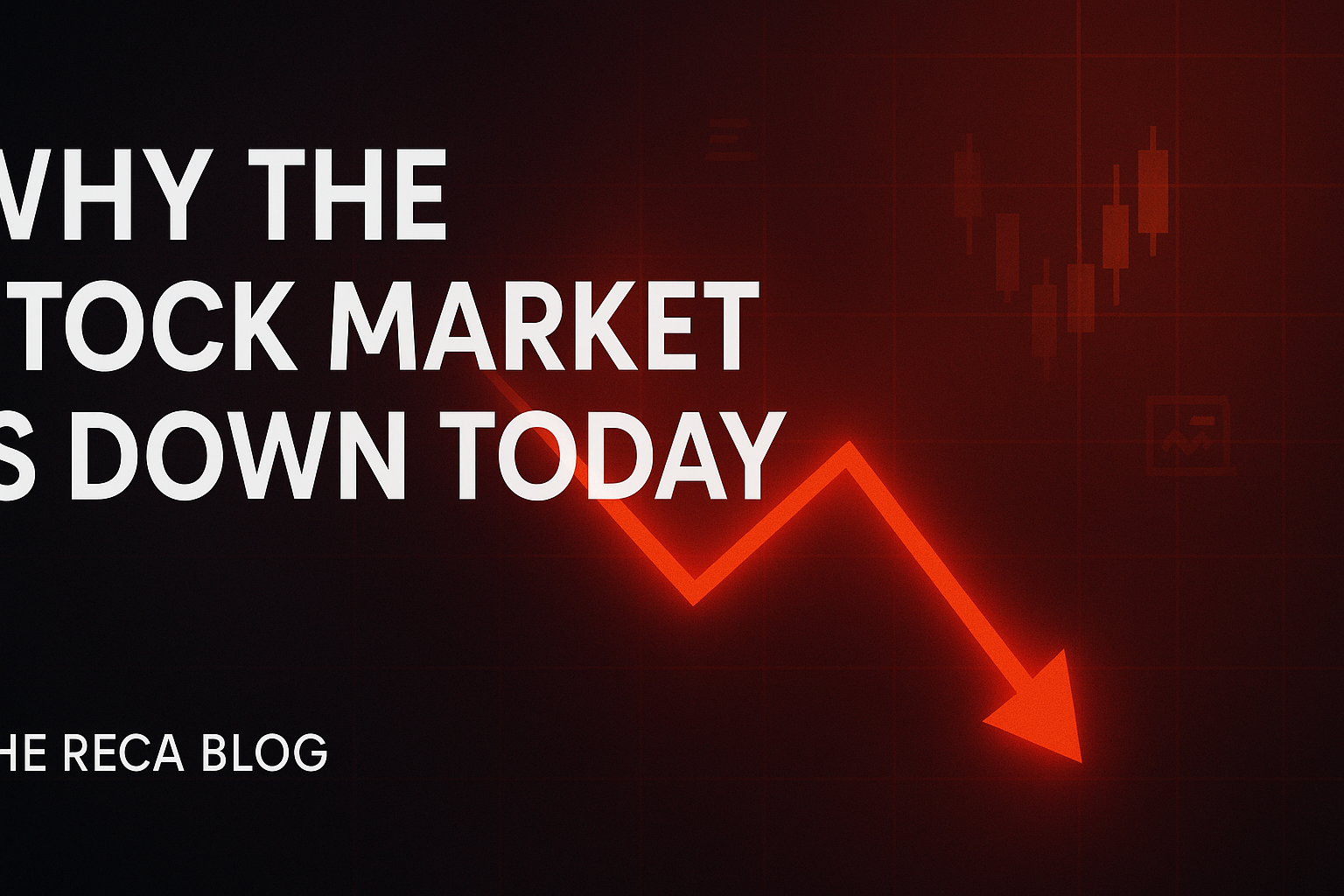The stock market is down today, and for good reason: mounting concerns about tech-valuations, weak labour data, and uncertainty around the economy have all converged in one volatile session.
What’s Driving the Decline?
When the stock market is down today, it signals that investors are acting on fresh signals of risk. Among the key drivers:
- Weak labour and business outlook
Recent data revealed that October lay-off announcements hit their worst level since 2003, with over 150,000 job cuts reported for the month. That kind of labour-market weakness raises fear that the broader economy might slow, which dampens investor appetite for riskier assets. - Overvaluation concerns in tech and AI-stocks
The stock market is down today in part because the technology sector — a large component of major indexes — is being punished. Investors are scrutinising whether the high valuations for AI-theme stocks are sustainable. When a large portion of the market becomes concentrated in one theme, a pull-back in that theme can drag the entire market. - Lack of data and policy visibility
With the Federal Reserve and other agencies lacking full clarity on inflation, employment and growth prospects, investors are less comfortable. Uncertainty reduces conviction and liquidity, making markets more vulnerable to sell-offs. - Shifts in interest-rates and bond yields
Although interest-rates have somewhat stabilised, when they remain elevated it makes future corporate earnings less attractive (because borrowing costs are higher). As yields rise or expectations of slower growth grow, stocks lose some of their shine.
Why This Matters for You
Whether you’re an investor, a business owner, or simply an observer, the fact that the stock market is down today carries several implications:
- Risk awareness increases: A falling market often reflects risk that had not been fully priced — e.g., growth slowing more quickly than expected.
- Sector-rotation may occur: When tech comes under pressure, other sectors (like defensive or value stocks) may outperform in the short run.
- Sentiment can dominate fundamentals: When emotions or fear dominate, even profitable companies can see share-price drops.
- Long-term investors may see opportunity: If fundamentals remain fine and valuations pull back, these moments can provide entry points — though timing is never guaranteed.
What You Can Do in Response
Here are some practical steps to take when the stock market is down today:
- Review your portfolio’s risk: Ensure your mix of stocks, bonds, cash is aligned with your time horizon and risk-tolerance.
- Avoid reactive decisions: Cuts made out of panic tend to lock in losses. Think through whether you are selling because of changed fundamentals or changed sentiment.
- Stay diversified: If the tech sector is dragging the market, having exposure to other themes or regions may help smooth returns.
- Look for quality: In downturns, companies with strong balance-sheets, stable cash-flows and prudent management often fare better than headline glamour-stocks.
- Stay informed: The story behind the market drop can change quickly. For updated commentary, it’s wise to follow expert-driven insights.
A Closer Look: The Mechanics Behind the Drop
When the stock market is down today, the mechanics usually involve 3 interconnected levers:
1. Valuation Pressure
When investors revisit assumptions (for example, that tech-growth will continue at a torrid pace), they may reduce the multiple they’re willing to pay. This revisiting can drive large losses for high-valuation stocks and pull down the broader market.
Because many indices are dominated by a handful of large tech names, the effect cascades into “the whole market”.
2. Macro and Economic Data
When employment, consumer spending, or inflation data disappoint, it raises the probability of slower growth ahead. Since stock-prices reflect future earnings, any threat to growth hits sentiment. The recent lay-off surge is a clear example.
3. Policy & Monetary Signals
When central banks leave rates elevated, or when investors doubt their ability to act nimbly, stocks face a heavier burden. Higher rates mean discounted future earnings are worth less, and borrowing costs for companies increase.
So – Why the Stock Market Is Down Today
Putting it all together:
- The U.S. labour market is showing cracks, raising fears of a growth slowdown.
- Tech/AI valuations are being questioned, and a pull-back in that segment is dragging broader indices.
- Political or policy ambiguity is creating extra anxiety among investors.
- Elevated interest-rates and bond markets are putting alternative asset classes in focus.
When the stock market is down today, it’s usually less about one bad number and more about a cluster of concerns synchronising.
Final Thoughts
If you came here wondering why the stock market is down today, you now have a clearer view of the inter-locking dynamics: valuation stress, macro-growth warnings, and policy uncertainty. For those who invest, it’s a reminder that markets move on both fundamentals and psychology.
Because smart investing isn’t only about the numbers — it’s about understanding the story behind them.
For further deep dives into market developments and why things move the way they do, I recommend checking out The Reca Blog — packed with insightful commentary, charts, and practical take-aways for savvy readers.
Frequently Asked Questions (FAQ)
1. Why is the stock market down today?
The stock market is down today due to weak labor data, tech overvaluations, and investor uncertainty about interest rates and economic growth.
2. Which sectors are most affected when the stock market is down today?
Technology, finance, and consumer discretionary sectors are often hit hardest during market declines, while defensive sectors may hold steadier.
3. How do interest rates influence why the stock market is down today?
Higher interest rates make borrowing costlier for companies and reduce the value of future earnings, leading to lower stock prices.
4. Should investors sell their stocks when the stock market is down today?
Not necessarily. Market dips can be temporary. Long-term investors often use these periods to identify value opportunities rather than sell in panic.
5. How can investors protect their portfolios when the stock market is down today?
Diversify investments, focus on quality companies, and maintain a long-term perspective to reduce the impact of short-term volatility.
6. Where can I find reliable updates about why the stock market is down today?
For accurate, insightful, and timely updates, visit The Reca Blog — your trusted source for financial insights and market analysis.








Leave feedback about this